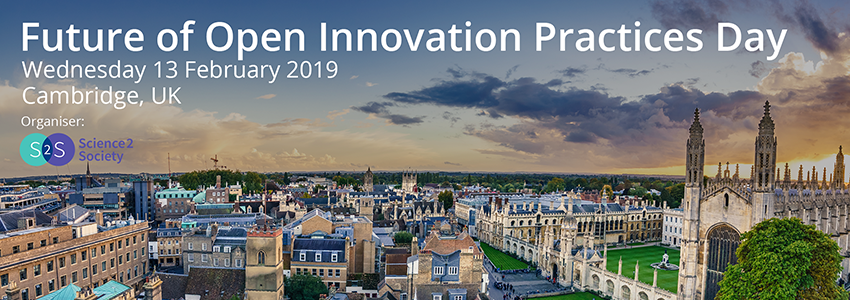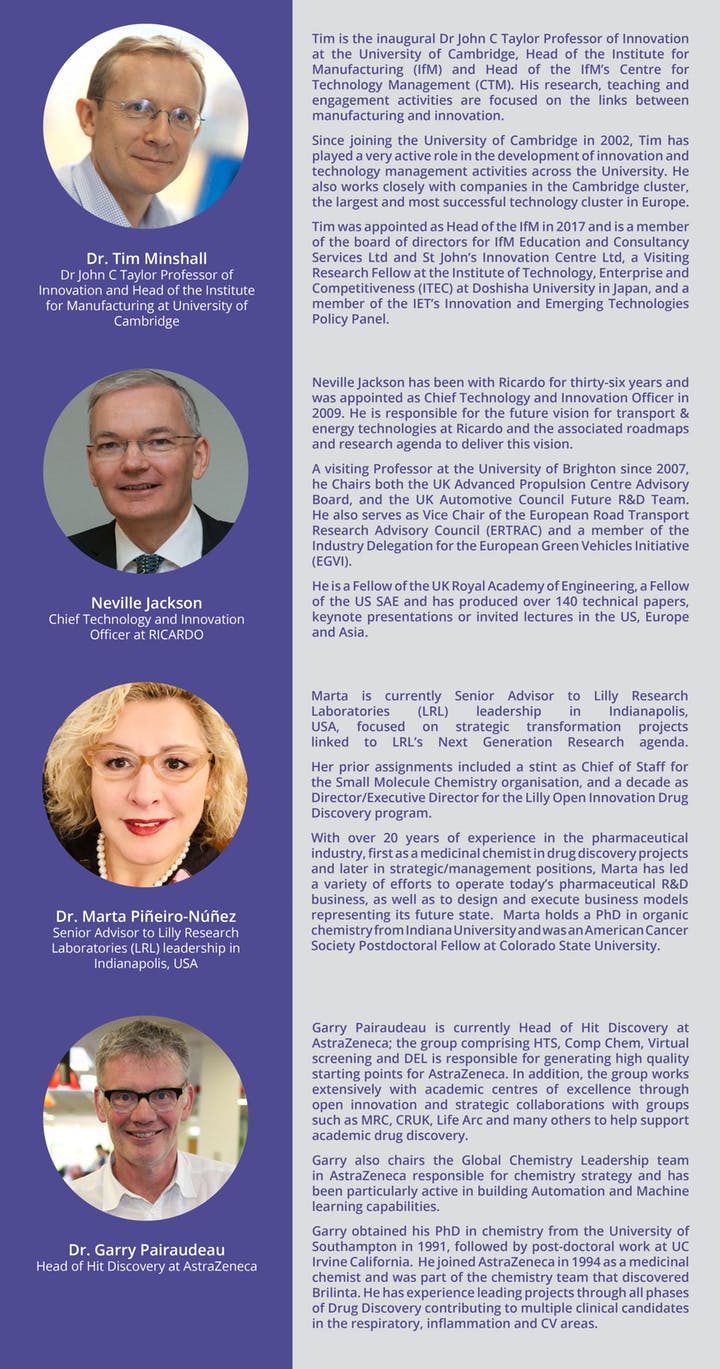Future of Open Innovation Practices Day

Future of Open Innovation Practices Day
09:00 - 17:00 | 13 February 2019
Crausaz Wordsworth Building, Robinson College
This full day of interactive workshops and talks will showcase tangible mechanisms for facilitating stakeholder interaction to ensure science’s impact on society and the markets.
Expect valuable insights from both Academia and Industry, with keynote speeches from Dr. Tim Minshall (Dr John C Taylor, Professor of Innovation at the University of Cambridge and Head of the Institute for Manufacturing (IfM)), Neville Jackson (Chief Technology and Innovation Officer at RICARDO), Dr. Marta Piñeiro-Núñez, Senior Advisor to Lilly Research Laboratories, and Dr Garry Pairaudeau, Head of Hit Discovery at AstraZeneca.
The event is the culmination of EC funded project Science2Society, researching the future of interaction between universities, industries and broader society as a whole.
Science2Society is one of very few projects that explore the future of innovation ecosystem interaction mechanisms, particularly borrowing best practices from Internet 2.0 and 3.0 platforms and communities.
The consortium is excited to share their key findings and recommendations with attendees, to support the ongoing innovation learning process.
Please click here to register online. The event is free of charge
Please select your parallel session using the form online here
Meet the speakers:

Parallel workshop sessions (afternoon)
Please select your preferred workshop in advance of the event, using the form online here
OPTION ONE:
Roadmapping for Strategic Planning
Roadmapping is a powerful technique regularly used by companies, government organisations and academic institutions to establish and support strategy and innovation. Roadmapping aligns, explores, manages and communicates the linkages between technology, research and product development to commercial objectives and market opportunities through a structured visual framework.
This hands-on workshop will guide you through a roadmapping template, showing how it can help individual or different organisations align technological and commercial objectives, as well as detailing our fast-start, resource-efficient approaches to developing roadmaps. The workshop will help you to:
- Combine various layers or levels of strategic information, both external and internal to organisations e.g. industry, market and technology trends and drivers, potential value streams, technology capabilities and resources.
- Align technology and commercial perspectives to aid decision making
OPTION TWO:
How to smoothen the journey for all stakeholders involved in creating university spin-offs
There are many critical steps involved in the creation of a university spin-off. Firstly, a proof of concept (or principle) has to be developed, as well as a functioning prototype. After attracting the necessary funding, the spin-off will need a successful business model in order to enter the market, attract the first customers, and become self-sufficient. To make this process as smooth as possible and to eliminate potential problems, it is vital that we take a closer look at the different tasks and questions that many different stakeholders involved in this process may have.
This hands-on workshop will help you smoothen the journey towards creating a university spin-off. To start, the pains and gains of all stakeholders in this process will be detected by directly engaging with other workshop participants as you discuss stakeholder personas and user journeys. Inspired by relevant megatrends in this field, an ideation session will follow, focusing on solutions for the detected pains and ideas to exploit the discovered gains. Specifically, this workshop will:
- Immerse you in the process of university spin-off creation to detect pains and gains
- Give you the opportunity to ideate possible solutions with other experts in the field
OPTION THREE:
Digitalisation - Prioritising and Selecting the Best Innovative Opportunities
When evaluating and selecting potential technology-based opportunities or projects, it is important to develop an objective approach that can be used consistently and transparently in a way that aligns with strategic objectives of the organisation, avoids bias, and does not rely on financial considerations alone.
This workshop will provide guidance on how to make the best use of the information that exists, how to choose the factors to evaluate; how to ensure that the scoring is as logical and objective as possible and how to include the inevitable uncertainty.
Specifically, this workshop will introduce you to the scoring method & digitalisation scenarios and give you the opportunity to:
- Quickly try them out (hands-on)
- Explore how you might deploy these within your manufacturing business
Please select your preferred workshop in advance of the event, using the form online here
For further information please contact:
Event location
Agenda
09.30 – Welcome
09.40 – Opening session
09.50 – Prof Tim Minshall, University of Cambridge
10.20 – Prof Neville Jackson, Ricardo
10.50 – Dr Marta Piñeiro-Núñez, Lilly Research Laboratories (LRL)
11.20 – Refreshments
11.45 – Dr Garry Pairaudeau, AstraZeneca
12.15 – Plenary round table discussion
13.00 – Lunch
14.00 – Science2Society results (enablers/barriers and policy implications)
14.45 – 3 parallel workshops on toolkits
1) Roadmapping for Strategic Planning
2) How to smoothen the journey for all stakeholders involved in creating university spin-offs
3) Digitalisation - Prioritising and Selecting the Best Innovative Opportunities
16.30 – Closing remarks
17.00 – Close
Event Timings
Date: 13 February 2019
Time: 09:00 to 17:00









